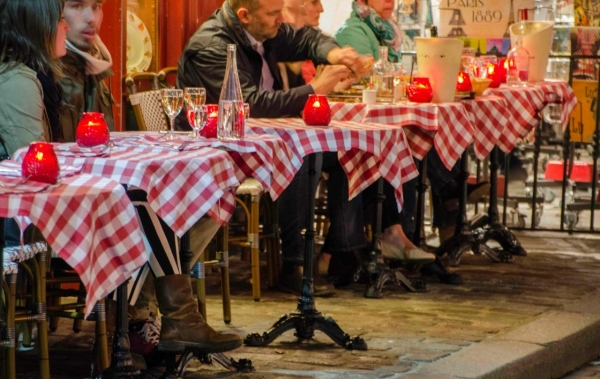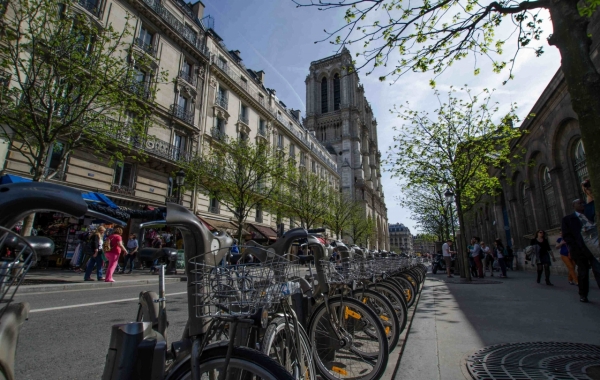Don't miss out on the best jobs!
Subscribe to HelpGoAbroad and weekly we will sent you an email with latest job posts. Provide your email address below
Visiting Paris? Or perhaps you’re intending to spend a little more time than a cursory few days in the City of Lights? Would you like to delve beneath the surface, and discover the behaviours, habits, and customs that will have you fitting in like a local?
From the etiquette of baguette-buying; to navigating the city like a pro; people-watching in the sidewalk cafe’s; to pedalling the streets on the popular Vélib bike-share system, this article will give you the lowdown on what it is that makes Parisians tick….so you can blend right in upon your arrival!
So here they are, 10 top tips to get you well on your way to making the most of your experience in this beautiful city:
1. Navigate like a local:
My top navigation tip is to become au fait with the arrondissements, the 20 zones or districts Paris is divided in to. Starting in central Paris on the northern side of the Seine is the first arrondissement, they radiate out clockwise from here until the 20th. All street signs will tell you which arrondissement you are located in, and each address will also indicate the arrondissement by the number 750XX, with 75 indicting the region of Paris, and the last two numbers the arrondissement. For example, 75001 is the first, 75002 the second, 75010 the 10th, and 75019 the 19th. Top tip: Rather than brand yourself an obvious tourist with a large fold-out map, be more discreet by investing in a pocket city guide such as Plan Éclair. It contains an index and maps of all the streets, as well as the public transport lines. The Plan costs €4.95 and can be purchased at Monoprix supermarkets, bookshops, and some of the newspaper and souvenir stands dotted around the city.
2. Cafe culture:
As soon as there is a ray of sunshine on display, nab yourself an outdoor table at a cafe. Settle in with a wine or a beer, and while away your afternoon critiquing…er….watching the passers by – a very Parisian past-time.
3. Bon appetit:
It is not uncommon to spend two or three hours in a restaurant having a leisurely meal, and you won’t be rushed out the door. Dishes you’ll find gracing the menu of traditional restaurants include: Soupe à l’oignon: a favourite dish as a starter, onion soup topped with bread and cheese; Boeuf bourguignon: beef stew cooked in red wine with vegetables; Coq au vin: marinated chicken slow cooked in red wine; Moules (avec) frites: mussels served with hot chips/fries; Crème brûlée: a rich creamy custard dessert that has been caramelised on top; Fondant au chocolat: a soft cake-like dessert with a gooey chocolate centre, usually served warm. To ask for the bill/check, request “l’addition, s’il vous plait” (bill please). Service is often included in the bill, otherwise you can leave some small change to round up the amount if you feel so inclined.
4. Cycle the city:
If the weather is in your favour, get some exercise and fresh air by hiring a bike. The Vélib system is the largest bike-share program in Europe, and there are bike stations about every 300 metres throughout the city - meaning you never have to go too far to find one! Purchase your ticket from the machine at the bike racks, a one-day ticket is only €1.70, or a seven-day pass is €8, both with unlimited usage. Trips of 30 minutes or less are free. It's not compulsory to wear a helmet, so ride safely – and don’t forget to stay on the right side of the street if you are from a country where this is not the norm!
5. Ride the metro:
Paris is a very walkable city, but at some point you will need to catch the metro. Buy a carnet of 10 or 20 tickets at the automatic machines (touch the screen to select your language), which provides better value compared to purchasing individual tickets. Each ticket in a carnet is valid for a single ride on the metro or bus. There are also day passes or multiple-day passes if you’re staying for longer, which offer great value if you plan to do several trips each day. Buyer beware: In some metro stations, people will offer to sell you single trip tickets. Avoid doing so, it is actually illegal - stick to the automated machines. Don’t be alarmed: If you take metro line 1, you won't see a driver at the front of the train! Line 1 was the first of Paris’ metro lines to be automatically operated, with an ongoing rollout planned across other lines.
6. The etiquette of baguette buying:
If you’re self-catering, buy your bread fresh - just prior to your meal - from one of the numerous boulangeries (bakeries) dotted across the city. With around 35,000 boulangeries throughout France, and 3.7 million tons of bread consumed every year, it is clear the French take their bread very seriously! Insider tip: To truly fit in like a local, break off the tip of the baguette as you make your way back to your hotel, and eat it as you walk.
7. Free museum entry:
Many attractions and monuments are free on the first Sunday of the month, some throughout the year, and others only during the winter months. Check out this website for the list of eligible attractions, and prepare to join the queues! Top tip: If you can't capitalise on the free Sunday entry, the ParisPass represents great value to take in a lot of the attractions at an affordable price. It is available for two, four or six days.
8. It’s all about the coffee:
Start your morning with un café – a short black (espresso) coffee - at one of the old-fashioned zinc-topped bars, with an optional fresh croissant. You’ll be mingling with the locals, and will witness them go about starting their day.
9. Parlez-vous anglais?:
Keen to get by with more French than just “Bonjour” (Hello) and “Parlez-vous anglais?” (Do you speak English)? Check out the BBC’s Ma France language series to hone your skills, with topics such as directions; dining out; shopping; hotel reservations and more. It contains videos with subtitles, vocabulary and grammar guides. Look up www.bbc.co.uk/languages/french/mafrance/ and click on “Start Ma France.” But if you’re not a natural when it comes to picking up new languages, don’t despair. A surprising number of French people speak very good English. Just make the effort to start with at least bonjour, and you’re half-way there.
10. How to become Parisian:
If you’re itching to learn more about how Parisians tick, then book yourself a seat to Olivier Giraud’s comedy show: How to become Parisian in One Hour. A hit with locals, ex-pats and visitors alike, he’ll have you living and breathing all things Parisian by the time the show’s over. Website and ticket information here. For more great things to see and do in Paris, check out sallyzeunert.com. Enjoy your visit!
Sign in to publish a comment




Be the first to comment on this post.